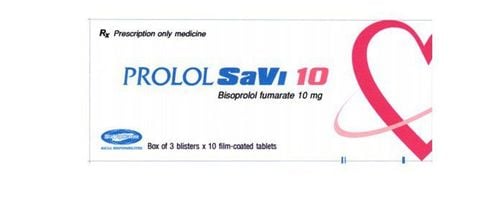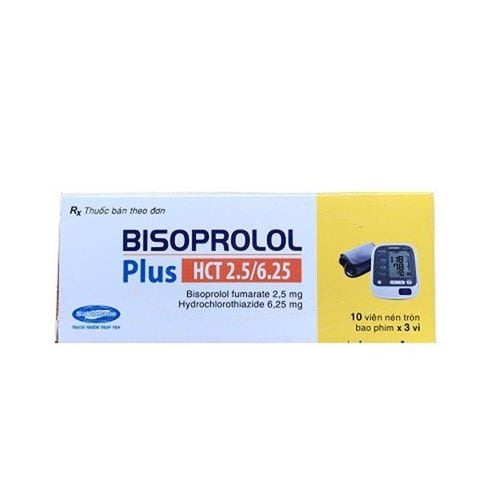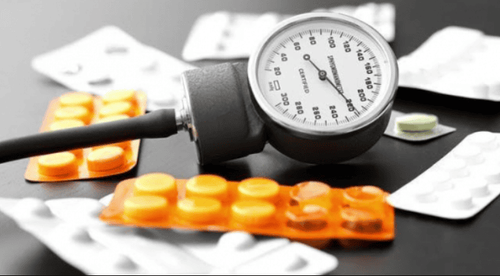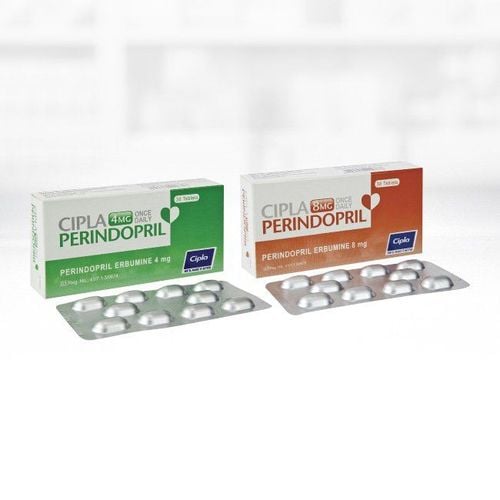This is an automatically translated article.
Bisoplus HCT medicine 5mg / 12.5mg is a drug indicated for the treatment of hypertension, containing two main ingredients, Bisoprolol and Hydrochlorothiazide. The following article provides you with information on what Bisoplus medicine has, dosage and notes when using the drug.1. What are the effects of Bisoplus HCT 5mg/12.5mg?
Bisoplus HCT medicine 5mg/12.5mg is a drug indicated for the treatment of hypertension, containing two main ingredients: Bisoprolol fumarate and Hydrochlorothiazide. The antihypertensive effect is additive. Hydrochlorothiazide significantly enhances the antihypertensive effect of Bisoprolol fumarate.Bisoprolol is a selective β1-adrenergic receptor blocker with no significant membrane stabilizing activity or intrinsic sympathomimetic over the therapeutic dose range. At low therapeutic doses Bisoprolol selectively inhibits the response to adrenergic stimulation, through competitive inhibition of cardiac β1-adrenergic receptors, whereas Bisoprolol has little effect on bronchial smooth muscle β2-adrenergic receptors and blood vessel. At high therapeutic doses, the selectivity of Bisoprolol on β1 - adrenergic receptors is often reduced and will competitively inhibit β1 and β2 - adrenergic receptors. Hydrochlorothiazide is a diuretic of the benzothiadiazine group. Hydrochlorothiazide acts on the renal tubular mechanism of electrolyte reabsorption, increasing the excretion of Na and Cl in equal amounts. Urinary excretion of Na causes secondary potassium loss.
2. Indications and contraindications of Bisoplus HCT 5mg/12.5mg
2.1. Point
Bisoplus is indicated in the treatment of hypertension, but when used alone Bisoprolol and Hydrochlorothiazide do not control blood pressure well.2.2. Contraindications
The use of Bisoplus is contraindicated in the following cases:Allergy or hypersensitivity to Bisoprolol, Hydrochlorothiazide, or any of the excipients of Bisoplus. Patients with untreated heart failure, decompensated heart failure, cardiogenic shock, bradycardia, sinoatrial block, 2nd or 3rd degree atrioventricular block, acute myocardial infarction, severe renal or hepatic impairment, severe bronchial asthma Addison's disease.
3. How to take Bisoplus HCT 5mg/12.5mg
3.1. Dosage
Bisoplus is used orally. When combination therapy is required for the control of hypertension, the dose is initially adjusted by administering Bisoprolol and Hydrochlorothiazide individually. Once the target maintenance dose corresponding to the ratio in the combination product is determined, the established combination can be used.Adults: The usual dose is 1 tablet/day. In some cases, the dose can be increased to 2 tablets per day. Patients with renal impairment, liver failure: reduce the dose when taking the drug. Children: Bisoplus is not recommended because there are no studies in children.
3.2. Overdose of Bisoplus HCT 5mg/12.5mg and treatment
Currently, there is no specific antidote to Bisoplus, treatment is mainly symptomatic and supportive.General management measures used include induction of vomiting or gastric lavage, use of activated charcoal, respiratory support, correction of water and electrolyte imbalances, and treatment of convulsions.
4. Unwanted effects when using Bisoplus HCT 5mg/12.5mg
Using Bisoplus HCT 5mg/12.5mg may experience the following undesirable effectsBisoprolol fumarate:
Body as a whole: edema, weight gain, fatigue, weakness, irritability. Cardiovascular: palpitations, bradycardia and other arrhythmias, hypotension, chest pain, dyspnea on exertion, congestive heart failure. Digestive: dyspepsia, nausea, vomiting, epigastric pain, gastritis, diarrhea, constipation. Respiratory: pharyngitis, rhinitis, sinusitis, bronchial asthma, bronchitis, cough, difficulty breathing. Urogenital - genitourinary: decreased sexual activity, impotence, cystitis. Psychiatric: insomnia, depression, nightmares. Central nervous system: dizziness, headache, dizziness, somnolence, anxiety, restlessness, decreased concentration and memory, paresthesia, decreased touch. Autonomic nervous system: dry mouth. Musculoskeletal: muscle pain, back or neck pain, muscle spasms, convulsions, tremors. Skin: skin irritation, itching, rash, eczema, flushing, hair loss, sweating, angioedema, exfoliative dermatitis, capillary inflammation. Senses: visual disturbances, abnormal lacrimation, eye pain, ear pain, tinnitus, taste abnormalities. Metabolism: gout. Hydrochlorothiazide:
Gastrointestinal: pancreatitis, jaundice, stomach irritation. Hematology: leukopenia, thrombocytopenia, hemolytic anemia. Hypersensitivity: purpura, photosensitivity, urticaria, necrotizing vasculitis, fever. Metabolism: increased blood glucose, urinary glucose, increased uric acid. Skeletal muscle: muscle contraction. Nervous system: restlessness. Kidney: interstitial nephritis, renal failure. Skin: erythema multiforme, Stevens-Johnson syndrome, toxic epidermal necrolysis. Eyes: transient blurred vision, evidence of yellow tint. When experiencing side effects of Bisoplus, stop using the drug and notify the doctor or go to the nearest medical facility for timely treatment.
5. Some notes when using Bisoplus HCT 5mg/12.5mg
Bisoprolol fumarate Bisoprolol should not be used in patients with uncontrolled heart failure. With caution in the initial period of drug use, it is advisable to start with a low dose of Bisoprolol and adjust the dose cautiously. Patients with prolonged PR conduction interval, peripheral circulatory disease such as Raynaud's syndrome need to be cautious when using the drug. Bisoprolol should be used with caution in patients with bronchospasm (bronchial asthma, obstructive airway disease). In patients with bronchial asthma, an increase in airway resistance may occur and this symptom may be considered an indication for discontinuation of the drug. Bisoprolol may mask hypoglycemia in patients with diabetes. In addition, the drug can mask the symptoms of hyperthyroidism in patients with thyrotoxicosis. Abrupt discontinuation of Bisoprolol may cause angina or myocardial infarction and ventricular arrhythmias in patients with coronary artery disease or thyroid storm in patients with hyperthyroidism. When Bisoprolol is discontinued in patients with coronary artery disease or suspected hyperthyroidism, careful monitoring is recommended and the patient is advised to temporarily limit physical activity. Because coronary artery disease is common and may go undiagnosed, abrupt discontinuation should be avoided in patients receiving Bisoprolol for another condition (such as hypertension). If severe angina or acute coronary insufficiency occurs after abrupt discontinuation of Bisoprolol, discontinue treatment for some time. Hydrochlorothiazide Use caution in patients with fluid and electrolyte disturbances or in patients at risk for altered water and electrolyte balance, such as the elderly. Cirrhotic patients receiving hydrochlorothiazide are likely to develop hypokalemia. Patients with impaired liver function or with advanced liver disease are prone to hepatic coma. Hyponatremia may occur in patients with severe heart failure with edema, especially with high doses and with limited salt intake. Monitor patients carefully for signs of fluid and electrolyte imbalance, especially in the presence of vomiting. Hydrochlorothiazide should be used with caution in patients with renal impairment as it may decrease renal function. Most thiazides are ineffective in patients with creatinine clearance < 30 ml/min. Hydrochlorothiazide may precipitate acute gout attacks in susceptible patients. Hydrochlorothiazide increases blood glucose and worsens or manifests diabetes. When used concomitantly, the dose of antidiabetic agents including insulin should be adjusted. Thiazide diuretics reduce urinary calcium excretion, sometimes leading to mild hypercalcemia. Hydrochlorothiazide should not be used in patients with a history of hypercalcemia. Thiazides have the potential to aggravate or activate systemic lupus erythematosus. In addition, the drug can increase the risk of developing gallstones, increasing cholesterol and triglyceride levels. Ability to drive and use machines: The use of Bisoprolol may cause side effects such as drowsiness, dizziness and fatigue. Patients should not drive or operate machinery if these side effects occur. Pregnancy: Hydrochlorothiazide crosses the placental barrier and appears in the blood of the umbilical cord. Some adverse effects may be encountered such as neonatal jaundice, pancreatitis, thrombocytopenia. Bisoprolol and hydrochlorothiazide should be used during pregnancy only if the potential benefit outweighs the potential harm to the fetus. Lactation: Hydrochlorothiazide is excreted in human milk. Small amounts of Bisoprolol (< 2% of the dose) were detected in the milk of rats. Because of the potential for serious adverse reactions in a nursing infant, consider the importance of the drug to the mother whether breastfeeding or discontinuing the drug.6. Drug interactions
Bisoprolol fumarate Rifampin: Concomitant administration of Bisoprolol increases the clearance of metabolites of Bisoprolol, shortening the half-life. However, there is usually no need to adjust the starting dose. Hydrochlorothiazide Antidiabetic drugs (oral drugs, insulin): may adjust the dose of antidiabetic drugs. Other antihypertensive agents: synergistic effects when used concurrently. Corticosteroids, ACTH: Concomitant use with Hydrochlorothiazide aggravates electrolyte disturbances, especially hypokalemia. Norepinephrine: Hydrochlorothiazide has the potential to decrease response to vasopressors. Lithium: diuretics reduce the renal clearance of lithium and increase the risk of lithium toxicity. Lithium and hydrochlorothiazide should not be used concurrently. Nonsteroid Anti-Inflammatory Drugs: In some patients, taking non-steroidal anti-inflammatory drugs reduces the diuretic effect and antihypertensive effect of diuretics. Therefore, when Bisoplus is co-administered with nonsteroidal anti-inflammatory drugs, monitor the patient closely to determine whether the desired diuretic effect is achieved.Please dial HOTLINE for more information or register for an appointment HERE. Download MyVinmec app to make appointments faster and to manage your bookings easily.













